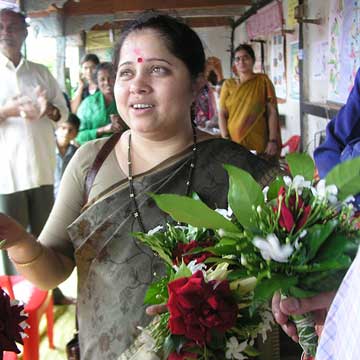 Half
Half the world lacks access to essential health services and more than 100 million people have been forced into poverty due to healthcare expenses - but the future is looking brighter.
For the 70th annual World Health Day, Sydney University is getting behind the World Health Organization’s fight for universal healthcare for all and backing their goal to provide 1 billion more people with access to health services by 2023.
How are we doing this you ask? The answer is education.
While humanitarian aid organisations and workers are on the ground making a real-world difference, there is also an active role for universities to play. Universities like Sydney can work to internationalise processes and extend influence by enhancing cross-cultural competence through international student recruitment.
Dr Vandana Joshi (MPHlth ’99), Alumni Award Winner for International Achievement is the perfect example.
When Dr Joshi was enrolling in her medicine degree, her mother showed her a photo of her nine-year-old self with a stethoscope around her neck wearing a big smile on her face.
“Being a doctor was my childhood dream,” Vandana says.
Growing up in a small town in India, Vandana remembers wanting to be like the only doctor in her community. Her desire to help others was strong.
After graduating from university in India, Vandana worked for four years in a remote community clinic, often without electricity. From very early on she realised that there was a need to focus more on health promotion and disease prevention rather than only treating the ill.
She applied for an AusAid scholarship at the University of Sydney, and on 20 October 1994 at 2pm, remembers receiving the call that would change her life, “It was the happiest moment of my life.”
She is a public health professional but her CV reads like the script of a television mini-series. In 2000, while working with tuberculosis patients in Kashmir, a bomb exploded just 25 meters away from her. People turned to her for help, “To be honest, I was scared, but I pretended to be brave. Sometimes life doesn’t give you choices, you have to act.”
In 2005, she was sent as a team leader to provide humanitarian care in tsunami-affected Andaman and Nicobar island, often spending nights outside in the open as a protection against aftershocks.
Then, in 2014, UNICEF sent her to the Ebola ‘red zone’ in Sierra Leone, to help fight the biggest health crisis on the planet at the time. When she joined, the infection rate was 100 percent, with the death rate among health workers at 90 percent. She lost two of her co-workers during the early response period.
When asked how she can bring herself to work in these disaster zones, Vandana has a very pragmatic response,
“If not me, then who?”
After many years in the field, she has armed herself with practical steps to staying sane: “Trust your team, ask for help when you need it; stop sometimes, eat your dinner and go to bed.” She tears up as she says, “All humans need to take care of themselves before they can take care of anyone else.”
With hard-work and grit she has made it through years of working in emergency situations and war-torn countries. It isn’t easy, but there’s one thing that keeps her motivated, “It’s because of the look in people’s eyes; the love in their eyes and you keep going.”
Vandana’s devotion and professionalism has brought her many awards. These include the TIME person of the year 2014, awarded collectively to the Ebola Response Team, and the 2014 UNICEF Global Staff award.
In her view, ‘good governance’ is the solution for driving universal healthcare for all, “The best health and happiness could only be enjoyed and experienced by people if there is good governance and accountable systems in place.”
Using local wisdom and resources, Vandana believes we can create a strong and sustainable community-based response systems in all areas, even after withdrawal of external aid.
Right now, Vandana is in Bhutan, working to make it the first country in the region to have zero mother-to-child transmission of HIV – an admirable goal that is within reach.
Her working life might read like a story of disaster and struggle, but the way Vandana tells it, it’s a story of hope, “Saving lives and spreading smiles are the most important things to me.” Source:
sydney.edu.au
 Half the world lacks access to essential health services and more than 100 million people have been forced into poverty due to healthcare expenses - but the future is looking brighter.
Half the world lacks access to essential health services and more than 100 million people have been forced into poverty due to healthcare expenses - but the future is looking brighter. 